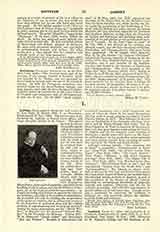

Lambert, Louis A., priest and journalist, b. at Charleroi, Pennsylvania, April 13, 1835; d. at Newfoundland, New Jersey, September 25, 1910. Educated at St. Vincent’s College and the Seminary of St. Louis, he was ordained for the Diocese of Alton in 1859. During the Civil War he was chaplain to the Eighteenth Regiment of Illinois Infantry (1861-3), and was under fire in many engagements, including the battle of Shiloh. From 1863 to 1868 he was on the mission at Cairo and Shawneetown, Illinois, and later at Seneca Falls and Waterloo in New York. When the Paulist Fathers established their house of studies at New York, Lambert was given the chair of moral theology. From 1890 till his death he was pastor of Scottsville, New York. For many years Dr. Lambert devoted his efforts to the up-building of the Catholic Press; he founded and edited the “Catholic Times” of Buffalo (1874-80), which was amalgamated with the “Catholic Union”, and became chief of the editorial staff of the Philadelphia “Catholic Times” (1880-82), and New York “Freeman’s Journal” (1894-1910). When the Buffalo papers were amalgamated Dr. Lambert was engaged to contribute a series of articles to the “Catholic Union”; he selected as his theme the teachings of Robert Ingersoll, the leading American agnostic. Ingersoll, though quite ignorant of even natural theology or the principles of logic, wild in his assertions, and badly informed, was, notwithstanding, gifted with an eloquent, witty tongue and facile pen and had wrought great havoc among the younger generation of Americans, and the learned attempts of non-Catholic writers to silence him were unavailing. In his series of articles, published later in book form as “Notes on Ingersoll”, Dr. Lambert pointed out in familiar language the agnostic’s multitudinous errors in religion, history, science, and even grammar. His method was simple, suited to the mental capacity of his untrained readers and so to Ingersoll’s. The latter failed to reply, and as a result his immense popularity waned at once. Since then, wherever the agnostic’s writings have been propagated, the “Notes of Ingersoll” has provided an excellent antidote, and has been utilized largely by non-Catholics. Dr. Lambert wrote later his “Tactics of Infidels” (Buffalo, 1887), a more scientific work, exposing the methods resorted to by the opponents of Christianity. In addition he composed “Thesaurus biblicus”, a handbook of Scriptural references, and “A Reply to Ingersoll’s Christmas Sermon”; edited “Catholic Belief” by Faa di Bruno; and translated “The Christian Father”, and “Instructions on the Gospels of the Year”; but his memory is best assured by his simple and complete refutation of Ingersoll. In his last illness he wrote for the Eucharistic Congress of Montreal (1910) a paper on “Some popular Objections to Belief in the Real Presence”, which was read in his absence and received the highest praise from the delegates.
A. A. MACERLEAN

